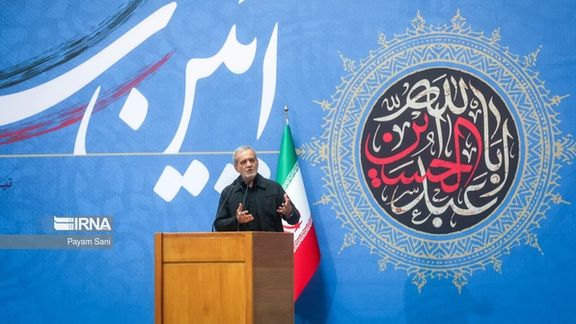Supreme Leader Ali Khamenei will endorse Pezeshkian and inaugurate his presidency at a ceremony on July 28. Two days later, he will be sworn in by the Parliament after which he will have two weeks to present his cabinet for a vote of confidence.
Pezeshkian's campaign has formed committees to investigate candidates for ministerial positions. Every committee, the campaign says, must include two academics and two “non-academic elite professionals", a representative of the Reforms Front, a representative of the private sector appointed by the Chamber of Commerce, two representatives of trade associations and non-governmental organizations, a representative of former ministers as well as a representative of “women and ethnic [groups] or [religious] minorities”.
The campaign has also said that at least 60 percent of the proposed ministers must be under 50 years of age, 60 percent should not have served as ministers in other governments and 20 percent must be women or belong to minorities.
Pezeshkian is first and foremost under pressure from voters who expect him to form a “different” cabinet that meets their many demands for improvement of Iran's international ties and the economy as well as more social freedoms and freedom of speech.
There are claims that Pezeshkian is under pressure from reformists and their de facto leader, former President Mohammad Khatami, to pick his cabinet members from among their candidates but neither Pezeshkian nor his campaign has commented about these claims so far.
The Sunni minority and various ethnic groups who voted for Pezeshkian expect him to give a proportionate share to their representatives in his cabinet, a difficult task given the Shiite nature of the regime. At the same time, women also expect him to appoint one or several female ministers.
Only one woman has ever been accepted as a minister in the Islamic Republic. It was under populist Mahmoud Ahmadinejad, before he fell from Khamenei’s favor in 2011.
Hamideh Zarabadi, Pezeshkian’s campaign spokeswoman, said Thursday that at least one woman is likely to be included in his list of proposed candidates.
Reformists' supporters have repeatedly reminded Pezeshkian of their role in his victory by chanting Khatami’s name as well as the name of Mir-Hossein Mousavi, the leader of the Green Movement who has been under house arrest since 2011, during campaign and post-election gatherings.
Supporters of his rivals have also been urging him to include some of their candidates in his cabinet to prove that he is an independent as he insists he is.
Above all these pressures and demands, Khamenei has always been heavily involved in the appointment of cabinet ministers according to an unwritten law that allows him to veto the president’s choices even before the cabinet’s presentation to the parliament.
Pezeshkian canceled his press briefing with international and domestic media representatives a day after the announcement of his election win to hold a five-hour meeting with Khamenei. He is likely to have been “advised” about his future moves including forming his cabinet.
The president’s powers in the appointment of ministers of foreign affairs, interior, defense, and intelligence are particularly limited since these ministries are considered as Khamenei’s "domain".
Reformist newspapers reported in 1997 that the conservative Ghorbanali Dorri-Najafabadi was the fourteenth option on the list of intelligence minister candidates that the reformist Mohammad Khatami proposed to Khamenei to get his approval.
Similarly, in 2011, Mahmoud Ahmadinejad’s insistence on replacing the intelligence minister, Heydar Moslehi, led to an eleven-day standoff between the Leader and the president. Ahmadinejad was reportedly given a choice: to keep the minister or resign.
Pezeshkian may face fewer challenges in appointing vice presidents who sit in cabinet meetings since the Parliament's approval is not required for these positions. Nevertheless, his choice of the head of the Atomic Energy Organization is considered very sensitive and likely to depend on Khamenei’s approval.
The new president and his supporters may be counting on some support from the more pragmatic hardliner Speaker Mohammad-Bagher Ghalibaf for helping the approval of his cabinet candidates. The latter’s bid for the presidency was aborted by ultra-hardliner rival Saeed Jalili and the Paydari (Steadfastness) Party that supported him.
Supporters of the two hardliner parliamentary factions have been blaming each other for the defeat in the snap elections and are fighting a full-on battle on social media.







